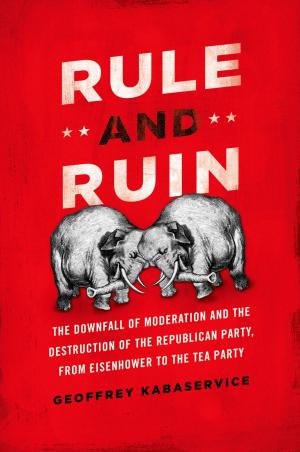Storm over Texas:The Annexation Controversy and the Road to Civil War
The Annexation Controversy and the Road to Civil War
Nonfiction, History, Americas, United States, Civil War Period (1850-1877), 19th Century| Author: | Joel H. Silbey | ISBN: | 9780199881499 |
| Publisher: | Oxford University Press, USA | Publication: | August 1, 2005 |
| Imprint: | Oxford University Press, USA | Language: | English |
| Author: | Joel H. Silbey |
| ISBN: | 9780199881499 |
| Publisher: | Oxford University Press, USA |
| Publication: | August 1, 2005 |
| Imprint: | Oxford University Press, USA |
| Language: | English |
In the Spring of 1844, a fiery political conflict erupted over the admission of Texas into the Union, a hard-fought and bitter controversy that profoundly changed the course of American history. Indeed, as Joel Silbey argues in Storm Over Texas, the battle over Texas marked the crucial moment when partisan differences were transformed into a North-vs-South antagonism, and the momentum towards Civil War leaped into high gear.One of America's renowned political historians, Silbey offers a swiftly paced and compelling narrative of the Texas imbroglio, with an exceptional cast of characters, including John C. Calhoun, John Quincy Adams, James K. Polk, and Martin Van Buren. He shows in particular how the Van Buren bloc of the Democratic Party--the "Barnburners"--stood at the heart the annexation controversy. We see how a series of unexpected moves, some planned, some inadvertent, sparked a crisis that intensified and crystallized the North-South divide, which then became, for the first time, a driving force in national affairs. Sectionalism, Silbey shows, had often been intense, but rarely widespread and generally well contained by other forces on the political landscape. But after Texas statehood, the political landscape was transformed into one sculpted by implacable sectional differences. The bitter discord over annexation--with slavery the core issue--was the seed from which America's great crisis of union grew, leading ultimately to Southern secession and Civil War.The Texas controversy released demons that were never again pushed back into the bottle. With subtlety, great care, and much imagination, Joel Silbey shows that this brief political struggle became, in the words of an Alabama congressman, "the greatest question of the age"--indeed, a pivotal moment in American history.
In the Spring of 1844, a fiery political conflict erupted over the admission of Texas into the Union, a hard-fought and bitter controversy that profoundly changed the course of American history. Indeed, as Joel Silbey argues in Storm Over Texas, the battle over Texas marked the crucial moment when partisan differences were transformed into a North-vs-South antagonism, and the momentum towards Civil War leaped into high gear.One of America's renowned political historians, Silbey offers a swiftly paced and compelling narrative of the Texas imbroglio, with an exceptional cast of characters, including John C. Calhoun, John Quincy Adams, James K. Polk, and Martin Van Buren. He shows in particular how the Van Buren bloc of the Democratic Party--the "Barnburners"--stood at the heart the annexation controversy. We see how a series of unexpected moves, some planned, some inadvertent, sparked a crisis that intensified and crystallized the North-South divide, which then became, for the first time, a driving force in national affairs. Sectionalism, Silbey shows, had often been intense, but rarely widespread and generally well contained by other forces on the political landscape. But after Texas statehood, the political landscape was transformed into one sculpted by implacable sectional differences. The bitter discord over annexation--with slavery the core issue--was the seed from which America's great crisis of union grew, leading ultimately to Southern secession and Civil War.The Texas controversy released demons that were never again pushed back into the bottle. With subtlety, great care, and much imagination, Joel Silbey shows that this brief political struggle became, in the words of an Alabama congressman, "the greatest question of the age"--indeed, a pivotal moment in American history.















